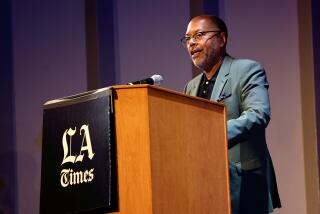AT&T; President Says Layoffs and Cutbacks Are a Thing of the Past
Massive layoffs and cutbacks are a thing of the past for AT&T;, company President Robert E. Allen said Friday.
“We don’t need to concern ourselves with early retirements, layoffs or other work force reductions,” Allen said in an interview while in Los Angeles to address the World Affairs Council.
Nonetheless, he acknowledged, the trauma of paring 32,000 workers in the nearly 3 1/2 years since American Telephone & Telegraph spun off its local phone companies to settle its historic antitrust case has left a legacy of “anxiety” among the remaining employees.
The cutbacks were credited last month for AT&T;’s 26% gain in profit, to $445 million, for the first three months of 1986 on revenue that fell about 7% to $8.12 billion.
That showing followed an extremely sobering 1986, in which the company set aside $3.2 billion to cover the cost of layoffs, plant closures and a reduction in the value of other assets and outmoded inventory. As a result, the year’s earnings plunged 91% to to $139 million, or 5 cents a share.
The company’s main task now, Allen said, is to expand AT&T;’s presence in the field of telecommunications and data networking--weaving telephone and computer systems together. Worldwide, AT&T; estimates, this amounts to a $526-billion market.
The complications of dealing in the international marketplace were underscored last month, however, when France rejected a bid by AT&T; and its Dutch partner, N.V. Philips, to buy a French telecommunications equipment company. Instead, it awarded the business--which last year sold $100 million in switching equipment to the French Ministry of Post and Telecommunications--to Sweden’s L. M. Ericsson.
“There was no question that our bid was the best in terms of technology, quality and price,” Allen told a World Affairs Council audience at the Hyatt Regency Hotel. He called the outcome “a politically driven, not a market-driven, decision.”
The West German government intervened on behalf of that country’s bidder, Siemens, prompting AT&T; to call on the U.S. government to urge French officials to stick to their announced intention to decide the issue on the basis of technology.
Finally, the French turned to a last-minute entry by Ericsson, ostensibly as a compromise choice, Allen told the gathering.
Despite that setback, he said, AT&T; remains focused on the global telecommunications and data networking market. Thus, he said, AT&T; will keep trying to pry open such major telecommunications markets as those of Canada, Japan, France and Germany.
More to Read
Inside the business of entertainment
The Wide Shot brings you news, analysis and insights on everything from streaming wars to production — and what it all means for the future.
You may occasionally receive promotional content from the Los Angeles Times.










